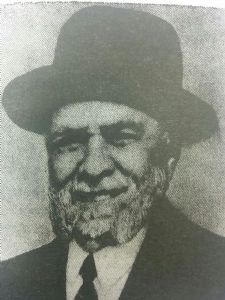A Short Tribute
Hacham Binyamin Mekiketz Didi was born to Esther and Hacham Yitzhak Didi in 1899, in Djerba, Tunisia.
He was raised in Djerba's Little Quarter and studied Torah with Hacham Makhluf Idan, and eventually headed the yeshiva in Tatouine.
Hacham Binyamin Mekiketz Didi immigrated to Israel and settled in Tiberias.
Hacham Binyamin Mekiketz Didi passed away on 1 Tammuz, 5729 (1969).
A partial list of his books includes Toldot Yitzhak – on ethics, sustaining the poor and the commandment of circumcision, Masat Binyamin – original commentary on Torah and other writings, which also contains Brit Shalom – ethics and resolve in Torah and good attributes, Ma'amar Esther – original commentary on the Book of Proverbs, and Yad Binyamin – original commentary on Ethics of Our Father, published by his son.
A few quotes from the Rabbi on 'Torah Study' in which he teaches that the value of studying with others is similar to that of prayer in community, and advises not to study as though one is a destitute person
"Hillel says: Do not separate yourself from the community. Do not believe in yourself until the day of your death." This follows from what our sages, of blessed memory, said. A person should share in the fulfillment of commandments with the community: When praying, pray in community, for "Behold, God is mighty; He is not contemptuous" even if there are, Heaven forbid, sinners among them. This is not the case with the single person, who is observed and whose acts are scrutinized. Just as with our Master, Moses, "He has turned to the prayer of the destitute and has not spurned their prayer", meaning the individual is observed, "and not spurned their prayer" – the prayer of the community. This is also the case with Torah study in community. It has added value, as the Peleh Yo'etz, of blessed memory, wrote: It is best to study in community, to make the learning both a service and a tribute. This refers to the Psalms, rather than to difficult and technical matters (nega'im v'ohalot), and similarly to all mitzvoth that are enhanced when performed "in the multitude of people" and are "the king's glory".
Yad Binyamin, p. 26. Published by Zvi Did, Tiberias, 1969
